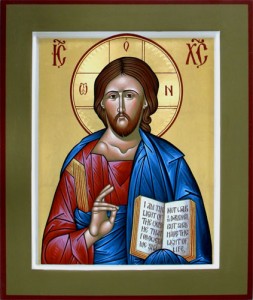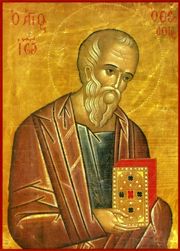|
|||
|---|---|---|---|
| This weekly bulletin insert complements the curriculum published by the Department of Christian Education of the Orthodox Church in America. This and many other Christian Education resources are available at http://dce.oca.org. | |||

In the final climactic verses of the eighth chapter of John's Gospel, Jesus so disturbs His hearers by the things He says that they take up stones to throw at Him. The verses leading up to this climax (8: 12-42) record a conversation between Jesus and some Pharisees. This dialogue is an example of people seriously misunderstanding what Jesus is telling them. It happens because they and He are coming from two different places. While He speaks to them of heavenly realities as God's divine Son, their comprehension is limited by the thought patterns and realities of this world. Jesus makes a startling claim: "I am the light of the world; he who follows me will not walk in darkness, but will have the light of life" (8: 12). The Pharisees don't really respond to His claim, grand and provocative as it is. Instead they raise an objection they've brought up previously: Jesus is bearing witness to Himself, and it takes the testimony of two men to make witness true. Willing to accede to their insistence that two witnesses are needed, Jesus points out that "I bear witness to myself, and the Father who sent me bears witness." But once again, rather than asking what He means, they ask a mundane, even insulting, question: "Where is your Father?" The question implies either that He is illegitimate and doesn't know His Father, or that Joseph, the one they know as His father, is too unimportant a person for Him to be making such lofty claims. But Jesus still tries to raise their level of understanding. They would know the Father, He tells them, if they really knew Him. Then Jesus tells the Pharisees that "I go away, and you will seek me and die in your sin; where I am going you cannot come." Instead of taking this as a challenge to their sinful behavior, they fall back for the third time on a superficial understanding: they speculate that He must mean He is going to kill Himself. The next verses show that Jesus doesn't simply consign the Pharisees to damnation. He says, "I told you that you would die in your sins, for you will die in your sins unless you believe that I am he." His hearers have every chance to know Him and gain salvation, and He gives them the means of doing so: by paying attention to "what I have told you from the beginning." 
In the chapter's final verses, Jesus says that "if anyone keeps my word, he will never see death." The questioners indignantly challenge Him. They ask, "Are you greater than our father Abraham, who died?" When He replies that "before Abraham was, I am" they take up those stones. Much easier to destroy Him with earthly questions and earthen stones than to follow Him and risk accepting that all He says about Himself is the plain, life-altering truth. |
|||
